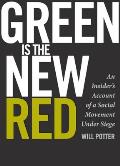
It's the most powerful word in our language. When someone is labeled a "terrorist," it automatically skews public opinion against them. That's why corporations and politicians have been so eager to appropriate the term for their own interests: It shifts attention away from the issues at hand, demonizes the opposition, and turns individuals into an amorphous threat.
When I decided to write Green Is the New Red: An Insider's Account of a Social Movement under Siege, I knew it would be driven by investigative journalism and political analysis, but it had to be more than that. I set out to tell the personal stories of people who have been labeled "eco-terrorists" and let their individual experiences (and in some places my own) guide the narrative. Through it all, I didn't want to lose sight of the fact that this is not an abstract political discussion: It is about real people.
One such person is Tim DeChristopher. As a University of Utah student, DeChristopher disrupted a Bureau of Land Management auction by offering fake bids on 13 parcels of land for nearly $1.8 million. A federal judge later ruled the government auction was illegal, a sham giveaway to oil and gas corporations, but DeChristopher was convicted of two felony counts for making bids when he knew he didn't have the money to pay.
DeChristopher is now facing 10 years in prison. That's 10 years for a completely nonviolent act of civil disobedience. Such a disproportionate, heavy-handed government response should concern all Americans, regardless of how you feel about DeChristopher or civil disobedience. But the impact of this case extends far beyond one activist. DeChristopher's "crimes" were a peaceful response to a global crisis, yet soon after the auction a Utah lawmaker introduced legislation labeling this style of civil disobedience "eco-terrorism." He said that stopping an oil and gas lease is no different than "burning down a man's cattle operation." DeChristopher "took millions of dollars away from us," he said, "and he's laughing at us. It's not right. It's not fair."
Disproportionate prison sentences and terrorist rhetoric are intended to make people think twice about engaging in similar tactics or even publicly supporting someone like DeChristopher. Instead of intimidating people into silence, though, DeChristopher's case has become a rallying cry for the environmental movement.
As DeChristopher said outside of the courthouse:
Everything that went on inside that building tried to convince me that I was alone and that I was weak. They tried to convince me that I was like a little finger out there on my own that can easily be broken. And all of you out here were the reminder, for all of us, that I was... connected to a hand with many fingers that could unite as one fist. And that fist could not be broken by the power in there... All those authorities in there wanted me think like a finger. But our children are calling to us to think like a fist."
To find out more about Tim DeChristopher visit Bidder70.org.